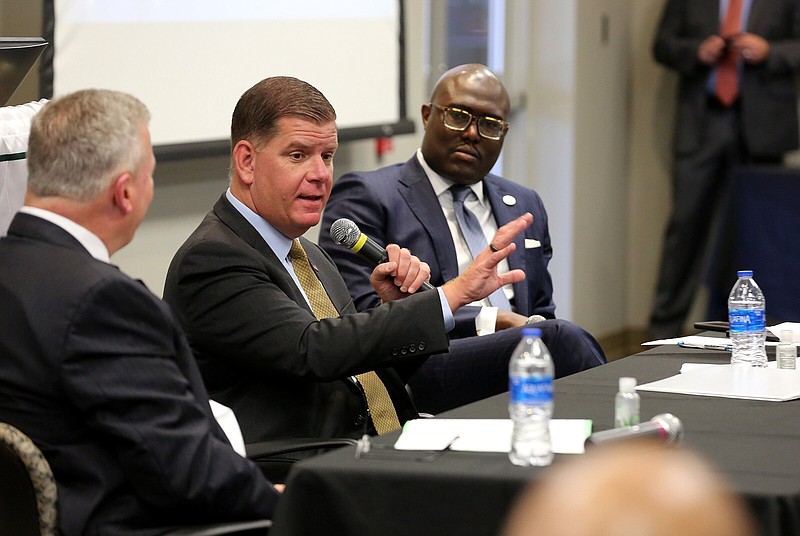U.S. Labor Secretary Marty Walsh stopped in Little Rock on Wednesday to tout an administrative effort to build jobs programs in the nation and he left behind $2 million to help the city get started.
The Little Rock Workforce Development Board will receive a $2 million Pathway Home Grant, which provides financial resources to support training and employment services to incarcerated people who are scheduled for release within 20 to 270 days from the time they enroll in the project.
The Little Rock agency already is working with community leaders, including the Pulaski County jail, the Division of Community Correction and Pulaski County Technical College, and plans to begin enrolling inmates by October, according to W.J. Monagle, executive director of the development board.
Federal aid will open job-training services to about 200 participants. "We're going to go into the facilities and this will be the first time we'll actually be working with inmates before they are released," Monagle said at Wednesday's event, which was led by Little Rock Mayor Frank Scott and Regional Chamber of Commerce Chief Executive Officer Jay Chesshir who were joined by about 100 other community leaders at Philander Smith College.
At the event, Walsh said the Labor Department is awarding $50.6 million in Pathway Home grants to 18 organizations in 14 states to provide training and employment services to adults re-entering the workforce from jail and prison.
Providing second-chance opportunities can strengthen local workforce initiatives and create an available labor pool for local employers, Walsh said, noting that President Biden recently identified workplace re-entry programs "as the key strategy to reducing repeat offenders and reducing crime."
As a former mayor of Boston, Walsh said he saw firsthand how job-training initiatives for inmates work. "If you create good strong jobs, trust me, they work," he said. "These grants will help people who are working for second chances. They're also about meeting the needs of the local labor markets."
Federal grants require participating agencies to maintain a recidivism rate of 20% or less. In Arkansas, the recidivism rate is around 50%, Monagle said, noting this will be the third grant the board has received to create job opportunities for inmates.
The two previous grants trained about 600 former inmates. One grant realized a recidivism rate of about 3% and the other was 9%. "We've had great success with these programs and it's really just about giving people an opportunity and teaching them how to be successful in the workplace," Monagle said.
Re-entry programs include setting up specific job training built around the food-services and industrial sectors. Soft-skills training also is included to focus on the interpersonal efforts needed to maintain work.
"It's important not just to teach people how to get a job but how to keep a job," he added. "It's a lot of stuff people either never know or they haven't used in a long time."
The new round of federal funding will be used to reach inmates while they're still jailed, providing opportunities to assess their skills and needs before they start looking for work. "We want to give them a direction and path before they even get out of the facility," Monagle said. "We want to try to lessen the challenges they'll face in re-entering the workforce as much as we can."
Pathway Home grants seek to improve coordination between key community partners involved in the re-entry process, including workforce development agencies, community and state corrections agencies, jails, local health and human service providers, employers and unions.
"Leaders across all industries recognize that providing incarcerated people with quality job training creates opportunities for them to reunite with their families, enter the workforce and attain stable, quality employment upon release," Walsh said in a news release announcing the program.
